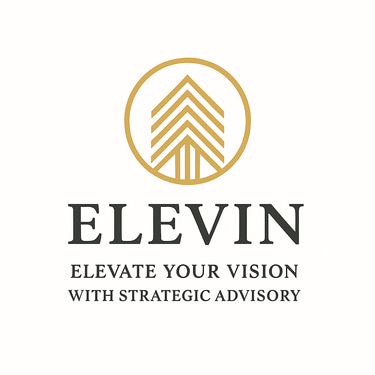The Future of AI: Agentic Systems and Human-AI Collaboration
Explore how human-AI collaboration enhances leadership effectiveness. Learn business impact, implementation strategies, and ROI from agentic AI systems.
Aishwarya
9/14/20255 min read
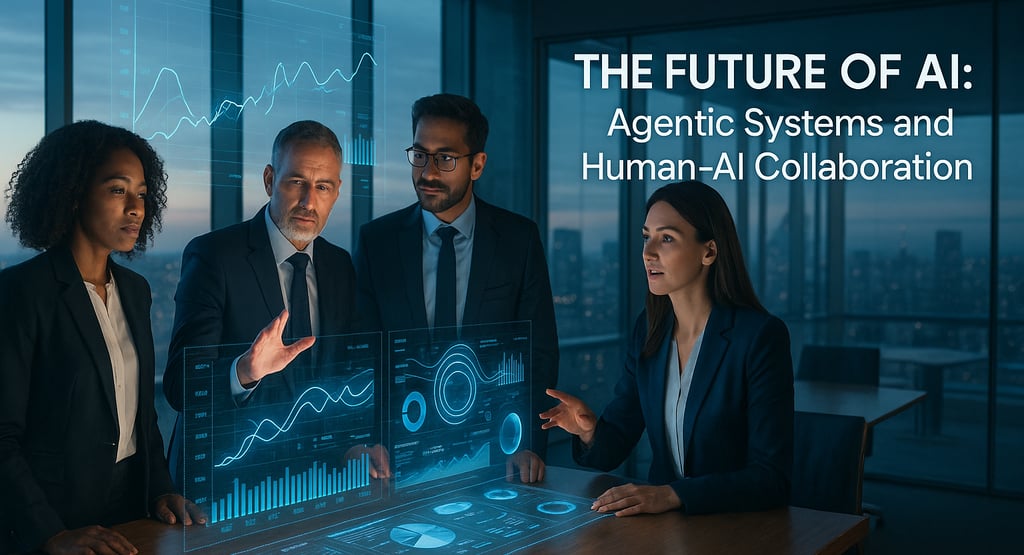

Introduction
Leaders today face mounting complexity: teams generate large volumes of data, projects span multiple functions, and market conditions shift constantly. Insights are often fragmented, reporting is delayed, and critical signals can be missed.
In this environment, leaders often spend more time reacting than guiding strategy. Small inefficiencies or overlooked opportunities can quickly impact revenue, operational efficiency, and long-term growth.
Increasingly, organizations are experimenting with AI agents, systems that go beyond simple automation to observe patterns, flag critical issues, and coordinate multiple actions across business functions. When integrated thoughtfully, these agents don’t replace decision-making: they amplify it, helping leaders focus on strategy, innovation, and high-impact priorities.
In this blog, we explore how AI agents are reshaping leadership, improving operational outcomes, and enabling organizations to make smarter, faster decisions. We’ll examine practical examples, measurable benefits, and strategies for integrating these agents effectively into your business.
Understanding the Evolution: From Reactive to Proactive AI
Traditional business systems and early AI solutions are reactive. They execute predefined tasks, generate reports on request, and respond to specific triggers. While valuable, they cannot anticipate problems or plan multi-step strategies.
Agentic AI represents a shift: these systems can assess objectives, develop strategies, and execute tasks with minimal supervision. Think of them as an intelligent assistant capable of monitoring multiple business functions, identifying anomalies, and suggesting corrective actions.
Example: A finance team using traditional tools might receive a monthly cash flow report. An agentic system continuously monitors accounts, detects unusual spending trends, predicts future shortfalls, and alerts leadership with recommended actions.
Deloitte predicts that by 2025, 25% of organizations using generative AI will launch agentic AI pilots, growing to 50% by 2027.
The Strategic Business Case for Agentic AI: Why Leaders Should Act Now
Market Momentum
The agentic AI market is expanding rapidly. Analysts project the market is bound to rapidly grow from $7.06 billion in 2025 to $93.20 billion by 2032. Additionally, more than one in four business leaders (26%) report their organizations are already exploring agentic AI to a large or very large extent.
This isn't just experimentation, it's strategic positioning. Organizations that successfully implement agentic AI gain advantages in decision speed, operational efficiency, and market responsiveness that compound over time.
ROI Through Collaboration
The financial impact of human-AI collaboration significantly exceeds traditional automation approaches. Enterprise organizations that partner with AI for enhanced decision-making achieve an ROI of $129.4 million annually, compared to just $65.1 million when AI is used for task-specific purposes.
This $64.3 million opportunity cost highlights a critical insight: the greatest value comes from treating AI as a strategic partner rather than an advanced automation tool.
Agentic AI: Transforming Core Business Functions
Revenue Operations and Sales
Agentic AI reshapes sales and revenue processes:
Lead qualification: Prioritizes opportunities with the highest conversion potential based on engagement signals and organizational fit.
Pipeline forecasting: Provides accurate projections using historical trends, market data, and internal metrics.
Competitive intelligence: Monitors competitor activity to inform strategy.
Sales teams using agentic AI report faster deal closure, higher conversion rates, and increased revenue per account.
Data-Driven Decision Making
Agentic AI helps leaders turn data into actionable insights:
Pattern detection: Identifies correlations across multiple datasets.
Real-time alerts: Flags anomalies or emerging opportunities promptly.
Strategic recommendations: Generates prioritized options for resource allocation and operational adjustments.
Customer Experience and Relationship Management
Agentic AI improves customer engagement without replacing human interaction:
Personalized recommendations: Tailors responses based on customer history and behavior.
Proactive issue resolution: Detects potential problems before they escalate.
Intelligent escalation: Routes complex cases to human experts.
These improvements enhance customer satisfaction, reduce support costs, and strengthen long-term relationships.
Human-AI Collaboration: The Leadership Advantage
Why Collaboration Outperforms Replacement
The most successful agentic AI implementations focus on augmenting human capabilities rather than replacing human judgment. This approach leverages the unique strengths of both humans and AI to create outcomes neither could achieve independently.
Human Strategic Advantages
Contextual intelligence: Understanding nuanced situations, cultural factors, and unspoken implications that pure data analysis might miss
Ethical reasoning: Making decisions that consider stakeholder impact, company values, and long-term consequences
Creative innovation: Approaching challenges from unexpected angles and developing breakthrough solutions
Relationship dynamics: Building trust, managing complex negotiations, and navigating interpersonal challenges
Agentic AI Operational Strengths
Scale and consistency: Processing thousands of variables simultaneously while maintaining quality standards
Continuous operation: Monitoring and responding to conditions 24/7 without fatigue or distraction
Pattern recognition: Identifying subtle trends and correlations across vast datasets
Rapid iteration: Testing multiple approaches quickly and learning from outcomes
PwC estimates human-AI collaboration could generate $15.7 trillion in global economic value by 2030, emphasizing strategic importance for leaders.
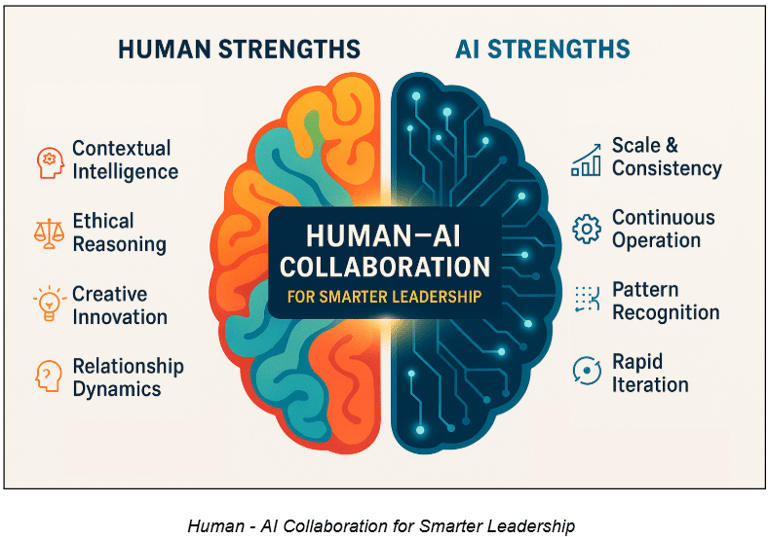

Strategic Implementation Framework for Agentic AI
Start with High-Value Use Cases
Focus on tasks that are rule-based, repetitive, or knowledge-intensive, such as report generation, market monitoring, and compliance workflows.
Build for Collaboration
Define clear decision boundaries for AI.
Create feedback loops to guide AI learning.
Train teams on human-AI interaction and oversight.
Address Trust and Governance
A recent study by KPMG revealed that less than half of the global population, just 46%, trusts AI systems, underscoring a persistent and critical 'trust gap' in AI adoption. Mitigate risk through transparency, incremental deployment, and oversight frameworks.
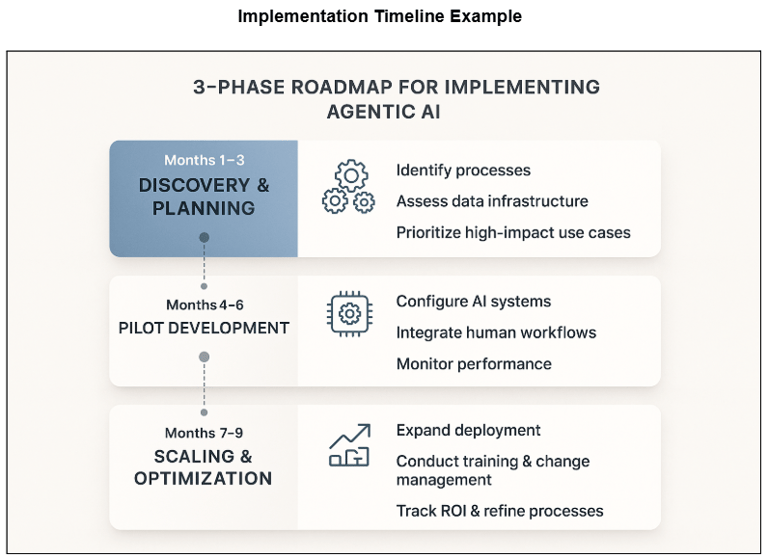

Overcoming Implementation Challenges
Trust and Governance Considerations
Transparency: Systems must explain decisions and recommendations.
Oversight: Supervisors need visibility and intervention capability.
Risk Management: Set boundaries and safeguards.
Compliance: Align AI actions with industry regulations and internal policies.
Technical and Operational Prerequisites
Data quality & accessibility: Clean, structured data and reliable access.
Integration capabilities: Seamless connections with business applications.
Security framework: Protect sensitive information and ensure secure AI communication.
Performance monitoring: Track AI performance, identify issues, and measure business impact.
Looking Forward: The Next Five Years
Market Evolution
By 2028, 33% of enterprise software applications will include agentic AI, fundamentally changing competitive dynamics. Early adopters gain advantages in:
Market responsiveness: Capture opportunities faster
Operational efficiency: Optimize processes and resources
Customer satisfaction: Deliver proactive, personalized service
Innovation velocity: Accelerate product development and market expansion
Preparing for the Transition
Organizations building agentic AI capabilities now will be positioned to capitalize on these changes. Delaying adoption risks falling behind competitors who integrate AI into core operations.
Strategic Next Steps for Leaders
Conduct a strategic assessment: Identify high-value processes for AI implementation.
Audit data infrastructure: Ensure quality and accessibility for AI partnership.
Develop change management capabilities: Prepare teams for collaborative workflows.
Start with focused pilots: Implement controlled trials to demonstrate value while minimizing risk.
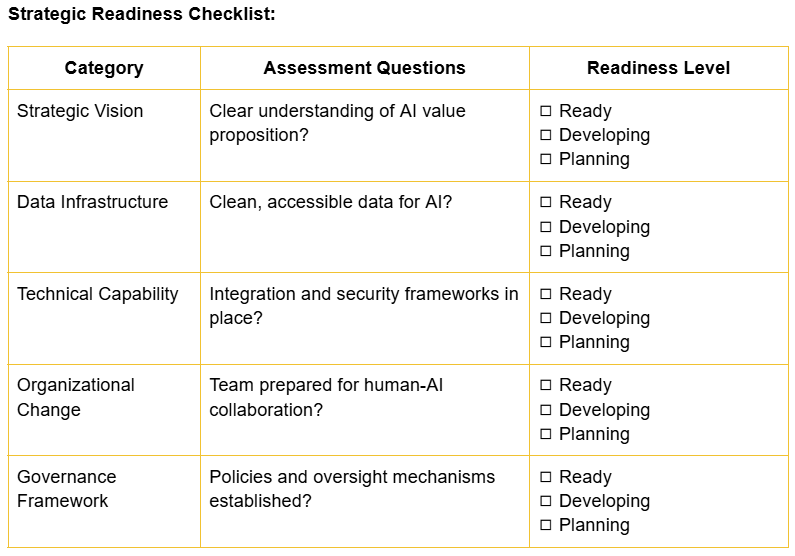

Partner with Strategic Agentic AI Implementation Experts
Successfully implementing agentic AI requires more than deploying technology—it demands strategic thinking, change management, and understanding how AI partnership transforms operations.
At Elevin Consulting, our Agentic AI consultation services provide support from strategic planning to implementation and optimization. Our approach aligns AI deployment with objectives, culture, and operational realities, creating sustainable human-AI partnerships that deliver measurable business value.
The future belongs to organizations that combine human creativity and judgment with AI’s analytical power. The question isn’t whether to adopt agentic AI—it’s how quickly you implement it strategically.
Ready to explore how agentic AI can accelerate growth? Schedule a strategic consultation.
Excellence
Elevin Consulting: Your Partner in Growth.
Impact
© 2025 Elevin Consulting Pvt Ltd. All Rights Reserved
Trust
hello@elevinconsulting.com
